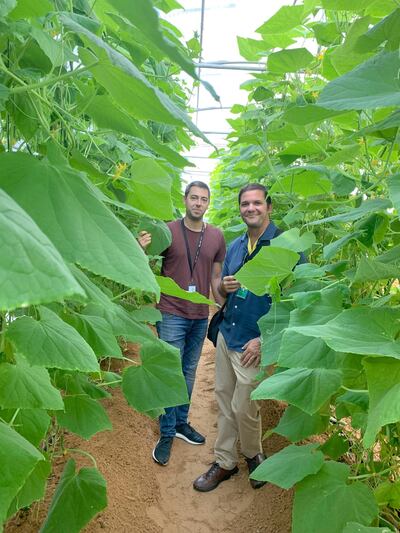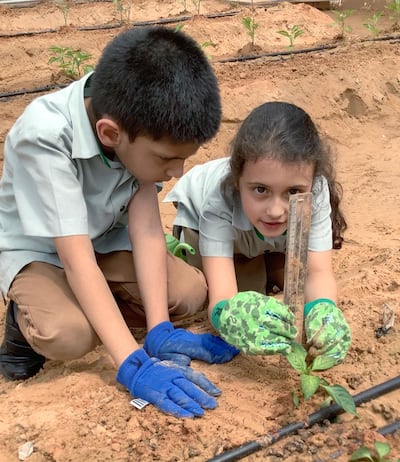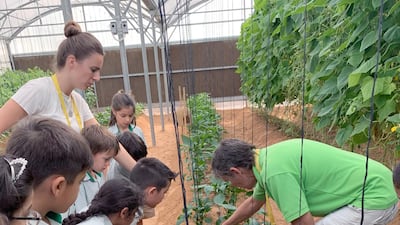Green-fingered children in Dubai could hold the key to a more sustainable future in the UAE as they get ready to bear the fruits of a successful organic farming programme.
The project, launched a few months back by The Arbor School, will mark World Environment Day on Friday, June 5.
It encourages children to consider the value of home-grown and locally sourced produce, rather than imported food.
Fruits and vegetables have been grown by pupils in a huge greenhouse on an eco-farm on the school grounds to teach the ecological processes involved in food production.
“The concept here is to go beyond a standard science lesson, allow the children to get their hands into the soil, really get back to nature and understand how their food is produced,” said Brett Girven, the school principal.
“It also allows us to connect with our community once we produce the food, placing it into our cafeteria, and then beyond that into composting.
“We want to ensure we are creating a perma-culture model, which is sustainable and doesn’t pump chemicals back into the system.”
The Arbor School, an ecological school in Al Furjan, launched the project in partnership with Emirates Bio Farm, the UAE’s largest private organic farm.
Farmers worked with school gardeners and ecologists to maximise food production in a purpose-built, energy-efficient, organic greenhouse alongside the school’s three larger biodomes.

The greenhouse is now home to the school’s first crop of organic fruit and vegetables, which have been planted by the children.
By December, more than half a ton of produce will be harvested and shared with the community with some expected to go on display at the school harvest fair.
Growing in the greenhouse are cucumbers, peppers, lettuce, tomatoes, carrots, aubergines, grapes and the list goes on.
While in the biodomes, a selection of herbs are growing alongside tropical fruits like pineapples, lemons and jackfruits.
“We aim to teach children to question their impact on the planet and to assume their responsibility as stewards of the future in a profoundly interconnected world,” said Mr Girven.

“Environmental justice means ensuring we have enough for all, forever.
“We hope other schools will be inspired by this idea and take on similar concepts. It’s incredibly exciting and rewarding.”
The theme for the United Nations-backed World Environment Day 2020 is biodiversity.
Elsewhere in Dubai, the day will be marked with an exhibition to show biodiversity in the emirate and methods to protect the environment during the coronavirus pandemic.
The municipality will host a virtual art tour that will celebrate regional biodiversity and the need to protect it.
The project will display 60 painting of wildlife, plants and examples of municipality operations to protect air, water and soil from pollution and erosion.
According to online analysts SEMrush, the UAE is becoming more tuned into the need for environmental protection.
Between May 2019 and April 2020, researchers said the word “recycling” registered a 51 per cent increase in web searches than the previous year.
Historical searches were examined dating back to 2015 and also showed a 85 per cent increase in the use of the words “plastic in the ocean”.
“This historical data shows that this is not a passing phase,” said Olga Andrienko, head of global marketing at SEMrush.
“It has become an increasing concern that can support marketing efforts to encourage sustainable practices.”


